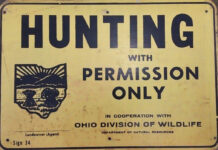The last week of July and first week of August were always the longest and hottest weeks of the year on the southern Illinois’ farm of my youth.
They were some of the most dangerous weeks of the year, also.
The danger did not arise from a hayfield-induced heat stroke or the killing boredom that accompanies canning 100 quarts of field corn.
Nope, the danger lurked in that other two-word woe on our farm: Uncle Honey.
Sweet, sweet Honey. Regular readers may recall my Great-Uncle Honey, the sweetest, kindest human ever to walk the earth.
A milkman by trade, Honey retired to our farm to delightfully discover the destructive power of farm machinery.
After that epiphany, Honey spent six days per week (seven, if he was fall plowing) tickling the chin of the Grim Reaper with sickle mowers, silage choppers, grain augers, five-bottom plows, fold-up disks, chain saws, balers and, well, anything that could be misused badly enough to deliver disability or death.
Even five-gallon gas cans were weapons of minor destruction for Uncle Honey, as I learned one early August nearly 40 years ago.
Worked with fuel. With little to do until silage chopping began later in the month, Honey often spent August mornings traveling the farm in search of prey: pecan tree stumps to burn, Johnson grass to kill, groundhogs to maim or murder.
Since no one on the farm trusted him with machinery actually designed to kill – like a rifle or hand sprayer – Honey went after all fated flora or fauna with a volatile 50/50 mixture of gasoline and diesel fuel.
In fact, rare was the day Honey was without a jostling can of the killing combination.
A good day for my father, the farm’s manager, was Uncle Honey returning at quitting time with the can untapped.
A bad day for Dad was when he’d spot smoke rising somewhere on the farm’s 720 acres.
Wiping out weeds. One early August morning, with five gallons of his lethal elixir already on the Oliver 770, Honey quietly (he did everything quietly – even arguing) asked my mother if I could be released from assisting in the kitchen to assist him treating Johnson grass.
Like everyone in the Mississippi Bottoms back then, Honey hated the prolific weed. Left untreated, Johnson grass could choke the life out of the farm in weeks.
A neighbor liked to say there were only three surefire methods to get it out of our lives: Pave over the entire farm, move or die.
That theory never stopped Honey from trying to do his part with his recipe.
Since Dad wouldn’t allow him access to any herbicides, Honey treated Johnson grass one of two ways: digging it out with a spade or dousing it with his gas/diesel mixture – that is, generously dousing it, at a two gallon minimum per square foot.
The potion killed the grass quickly all right, but it also guaranteed nothing would grow on the spot for years – maybe decades.
Fired up. Our first stop that fateful morning was to kill another couple of square yards of the farm for another couple of years.
Upon arrival, Honey slowly inspected the patch from the tractor seat, then leapt into action.
Can in hand, he sloshed the offensive grass with several gallons of his unpatented medicine.
Then, without so much as a word or a sigh, he pulled a kitchen match out of the bib of his overalls and in a single, well-practiced motion struck it on the 770’s drawbar and tossed it on the fuel-soaked grass.
Whoosh! The air, dirt and my short life exploded in a column of napalm.
I felt my face scorch and smelled my eyebrows burning.
Honey, practiced as he was, turned away at the last instant and escaped any damage.
“Maybe I didn’t put enough diesel in,” was all he could say when he discovered he had not cremated me.
“Come to think of it,” he added a second later, “I might not have put any diesel in it at all. Hmm.”
Hmm?
Extinguishing suggestion. Later, while on our way to immolate some groundhogs, Honey had a quiet suggestion.
“Best not tell your Mom and Dad about that last thing.”
(Alan Guebert’s Farm and Food File is published weekly in more than 75 newspapers in North America. He can be contacted at agcomm@sbcglobal.net.)













